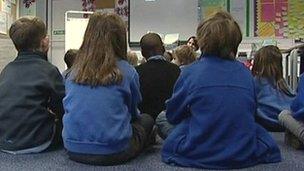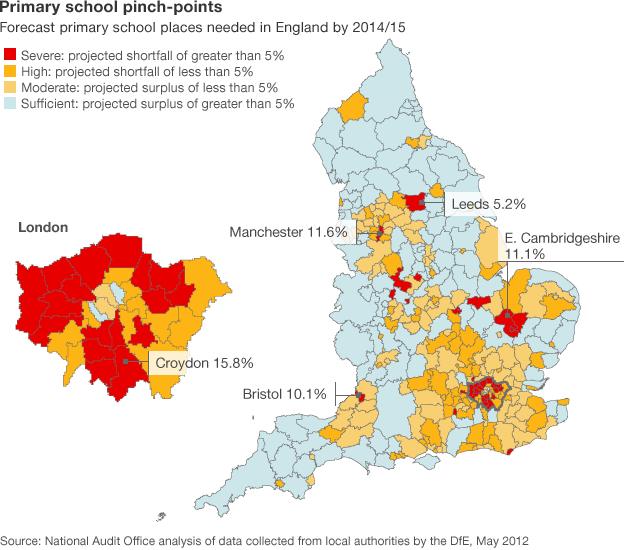Urgent need for 250,000 school places, spending watchdog warns
- Published

Much of the demand for places will be in London
A quarter of a million extra school places will be needed in England by autumn 2014 to meet rising demand, the National Audit Office (NAO) is warning.
The spending watchdog said one in five primary schools in England was full or near capacity and there were signs of "real strain" on places.
The demand for places has been driven by the birth rate rising more quickly than at any time since the 1950s.
Ministers say 80,000 extra places have been created and demand will be met.
Schools Minister David Laws said the government was "reversing completely idiotic policies" followed under Labour that had seen 200,000 school places cut.
Labour has denied the claim and accuses the coalition of creating a "crisis".
The NAO's report said that despite the creation of those 80,000 extra places in the past two years and an overall surplus of places nationwide, the system was under strain and that, until last year, vague data meant the government was unable to identify "hotspots" easily.
In total, 256,000 new school places are needed by 2014-15 - 240,000 in primary schools, it said.
London has the greatest need, accounting for 37% of the extra primary places required, according to the NAO. But there are pressure points in Leeds, Manchester, Bristol, Cambridgeshire, Derby, Hampshire and other areas too.
Schools across the capital have been expanding by adding extra classes or new buildings, but the NAO said it remained unclear how many places would be needed in the next few years.
In 2012, the Department for Education said 400,000 further places could be required by 2018-19 and it has said it is spending £5bn providing extra school places over the lifetime of this Parliament.

Local councils have a legal duty to ensure there are school places for all children in their areas, but the NAO said local planning was affected by uncertainty over future funding for extra places.
It said the Department for Education had used four different methods to allocate funding for school places since 2007, but that "its current approach provides a clearer focus on the areas of greatest need".

Actual births have risen much more than was projected last decade
National Audit Office head Amyas Morse said: "The department has ambitious objectives to provide school places, and to enable parents to have some choice of school for their children.
"However, despite increases in places and funding over the last two years, it faces a real challenge. There are indications of strain on school places."
Baby boom
Government officials said no local authority had failed in its duty to provide a school place for every child and that new systems meant funding was now better targeted to councils with the greatest pressure on places.
Schools Minister David Laws told BBC Radio 5 live the government was tackling the problem and had increased funding for new school places to double that spent in the previous Parliament.
He said he thought the government would be able to create the quarter of a million places needed by September next year.
And he blamed Labour for the problem.
"Labour reduced the number of places available even though there was a baby boom under way. We have already created 80,000 new places to deal with the shortage of places left by the last government and there will be more places to come."
Labour has previously rejected that claim, saying pressure on places had worsened since 2010.
Shadow education secretary Stephen Twigg said: "David Cameron and George Osborne have cut capital funding by 58%. Their free school programme is setting up schools in areas which already have enough places. Instead of dogma the government needs to look at the evidence of where new schools are most needed."
The NAO said the rising birth rate was related to a 6% increase in numbers of women of child-bearing years since 2003, plus older women who did not have babies in the 1990s having them in the 2000s.
Part of the story is also likely to be the arrival of newcomers from overseas. Official statistics published in the autumn showed a quarter of births in 2011 were to women born outside of the UK.
David Simmonds of the Local Government Association said councils were facing "unprecedented pressures in tackling the desperate shortage" of new school places.
"The process of opening up much-needed state schools is being impaired by a lack of capital funding and in some cases by the presumption in favour of free schools and academies," he said.
- Published15 March 2013
- Published1 March 2013
- Published13 December 2012
- Published4 September 2012
- Published10 January 2012
- Published11 December 2012